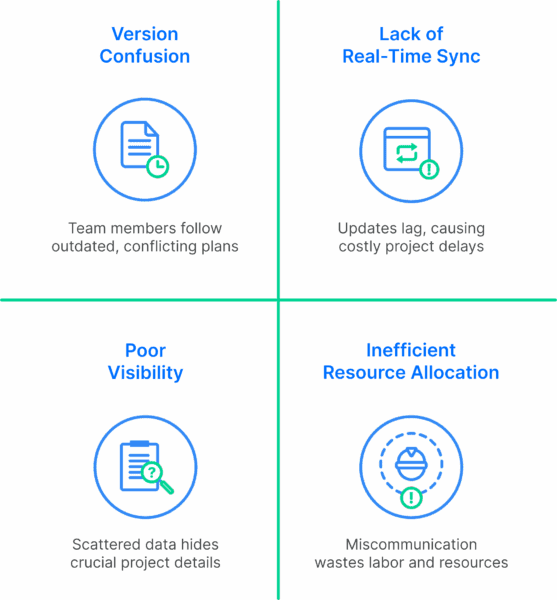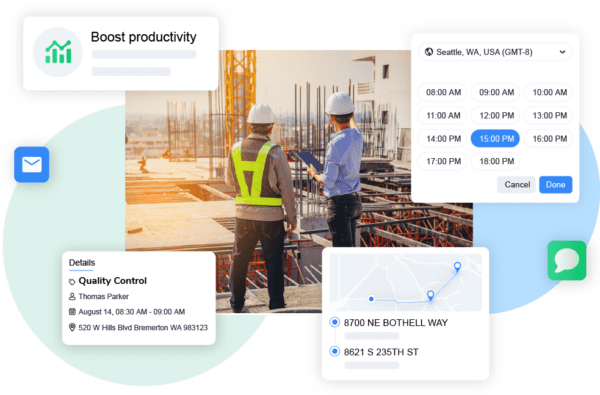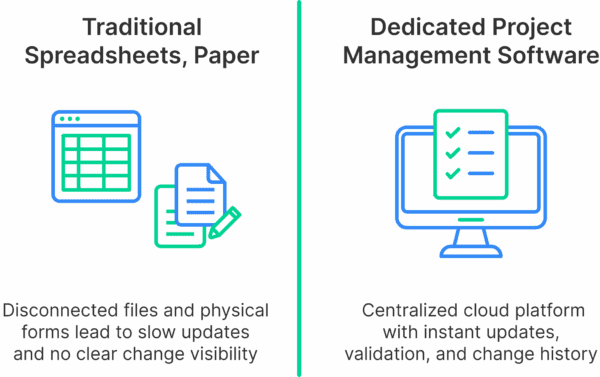
What is it that nearly every construction project seems to run late or bust its budget? The answer often lies in the complexity of manual planning.
Industry Insights
Industry data show that large construction projects typically end up 20% behind schedule and up to 80% over budget.
In construction, the margin for error is razor-thin. A single miscommunication or minor delay can trigger a chain reaction that derails the entire timeline.
Such shocks are painfully common. Decades of research and case studies show that outdated processes (think sticky notes, spreadsheets, and lengthy phone tag) inevitably yield errors and bottlenecks. Without real-time visibility, managers miss critical updates until it’s too late.
Fortunately, modern construction project management software is engineered to fix these gaps. By centralizing schedules, automating resource assignments, and keeping the whole team connected, including contractors, the right software can dramatically sharpen scheduling accuracy.
Recommended Reads
Why Do Construction Timelines Slip Up?
Construction projects are famously unpredictable. Even with intricate planning, factors beyond your control pop up all the time. For instance, sudden weather changes, delayed permit approvals, material backorders, or a subcontractor slipping behind.
All these can shift the timeline overnight. For example, heavy rain might halt exterior framing, forcing crews to scramble or sit idle. Similarly, if one contractor is delayed, it often creates a domino effect on the next tasks, magnifying the schedule slip.
Traditional communication methods worsen the problem. If field crews can only report progress by phone or via end-of-day reports, the information arrives too late. At the same time, manual scheduling inherently introduces errors. A forgotten shift in a Gantt chart or a typo in a date on a spreadsheet can throw off the entire plan. Shared spreadsheets, in particular, become unreliable as multiple people edit them. Construction managers have found that spreadsheets require constant version control.
What Lack of Data Brings?
No wonder 14% of construction rework globally is blamed on insufficient data. In other words, if your schedule is wrong or out of date, your project will pay the price. [Source]
Breaking Free from Spreadsheets and Sticky Notes
Let’s dig deeper into what goes wrong in the old-school approach. Common issues include:
Version Confusion
In spreadsheet-based scheduling, there’s no guarantee that everyone is working off the same plan. A small edit like shifting a framing deadline might live in one person’s file but never reach the rest of the team. By the time the change surfaces, crews and contractors have already moved on the wrong schedule, wasting time and resources. Without a single, live version of the truth, misalignment becomes inevitable.
Lack of Real-Time Sync
In a traditional workflow, data travels slowly. A supervisor marks a task complete on paper at the end of the day, the office gets that info by the next morning, and only then can the schedule be adjusted. In fast-moving projects, that lag is lethal.
Poor Visibility
When schedules, RFIs, and specs are scattered in email threads or binders, the office staff has no single source of truth. Without centralized tracking, critical tasks are on the brink of loosing track. By centralizing all project data in one place, the software ensures every update is captured and shared.
Inefficient Resource Allocation
Manual scheduling can easily double-book equipment or overstaff one site while another sits idle. For example, one crew might be idle because steel delivery was delayed, while another site is short of labor due to miscommunication between contractors and the main office. The result is wasted payroll or premature overtime.

How Construction Project Management Software Fixes This?
The real measure of any scheduling tool is whether it can turn unpredictable construction timelines into predictable outcomes. Arrivy does this by combining scheduling, dispatching, communication, and reporting into one seamless platform. Here’s how its core features directly sharpen scheduling accuracy:

Dynamic Bookings that Adapt to Change
Construction rarely follows a perfect script as permits get delayed, material deliveries shift, or clients reschedule site inspections. Arrivy’s dynamic booking engine adapts to these changes without throwing the entire timeline off track. Managers can configure buffer times, adjust availability, or block specific windows, ensuring schedules remain both flexible and accurate.
Smart Dispatch that Matches Skills to Jobs
Assigning the wrong crew to the wrong task is a recipe for delays. With Arrivy’s intelligent dispatch, it automatically considers location, skill sets, and availability. This prevents double-booking, minimizes travel time, and ensures the right people are at the right site, every time.
Route Planning for Field Efficiency
Traffic, distance, and site sequencing often eat into productive hours. Arrivy’s route optimization shortens travel times, slashes fuel costs, helping crews arrive on-site faster and in the right order. Over time, this reduces wasted labor hours and keeps critical path tasks on schedule.
Work Order Management as a Single Source of Truth
Loose paperwork and disconnected spreadsheets make schedules unreliable. Arrivy centralizes work orders, linking every job to timelines, resources, and crews. This real-time visibility ensures managers always know what’s in progress, what’s delayed, and what’s coming next.
Crew Mobile App for Real-Time Updates
Accuracy in scheduling depends on information flowing both ways. Arrivy’s mobile app gives crews job details, connecting field crews to back-end office, and instant status updates. Field progress syncs back to the office immediately, keeping the master schedule precise to the minute instead of a day behind.
Digital Forms That Eliminate Paper Delays
From safety checklists to inspection reports, paperwork often slows down projects. Arrivy digitizes these forms, allowing crews to capture and share information instantly. No more waiting for paper forms to travel back to the office before updating schedules.
Reporting & Analytics That Highlight Bottlenecks
A schedule is only as strong as its monitoring. Arrivy’s analytics compare planned vs. actual progress, spotlight delays, and track resource utilization. Managers can see trends before they become problems and adjust timelines proactively instead of reacting to missed milestones.
Customer Experience as a Scheduling Asset
Unhappy clients often create extra site visits, change requests, or rework all of which throw off timelines. Arrivy reduces this risk by keeping customers in the loop with live ETAs, automated reminders, and status updates. Better communication means fewer disruptions to the master plan.
Billing & Invoicing Linked to Project Progress
Delays often stem from misaligned financial workflows; when invoices lag, projects stall. Arrivy ties billing and invoicing to real-time job updates, ensuring cash flow and scheduling stay synchronized. This financial alignment keeps work moving without administrative slowdowns.
Streamline Every Crew, Task, and Timeline
Disconnected systems slow projects down. Arrivy brings everything into one platform for seamless execution.
The Proof Is in the Project
The benefits of accurate scheduling aren’t just theoretical. According to industry surveys, construction is one of the least digitized sectors, yet projects that do adopt digital tools see huge payoffs.
For context, remember that 98% of mega-projects experience delays or overruns. But successful firms are starting to flip that script.
A recent study of construction scheduling trends found that the frequency of updating schedules has doubled — from 1.4 updates per month (2022) to 2.8 updates per month (2024). This rush of updates reflects that change is constant, so the smart firms update more frequently to stay on track.
Spreadsheets vs. Smart Software
If you’re still on the fence, consider a direct comparison:
Spreadsheets/Paper
Data lives in individual files and physical forms. Multiple versions float around. Updates happen slowly, if at all. It’s very easy for someone to enter the wrong date or for two people to edit the same schedule offline and cause conflicts. There’s no audit trail, as you aren’t aware of who changed the plan, or even if everyone has the latest one.
Dedicated PM Software
Data is centralized in the cloud. Every update (from the field or office) immediately revises the master schedule. Input errors are caught by validation rules. The system maintains a history of changes so you always know when and by whom a task was shifted. Alerts and dashboards keep everyone informed (instead of chasing down emails).

In short, spreadsheets were useful 20 years ago, but they simply aren’t built for today’s construction complexity. As one industry comparison puts it, while sheets can be edited in real time, they lack the built-in controls and context that project software has. Construction PM software presents information “more straightforwardly and tracks real-time changes” so that project managers “don’t have to start from scratch to verify which version of any document is accurate”. That clarity alone can shave days off delays and prevent expensive double-bookings.
How Arrivy Stands Out?
What sets a top solution apart? Arrivy is one example of a platform built with scheduling accuracy in mind. Its construction-focused suite includes scheduling & dispatch tools, mobile field apps, customer notifications, and reporting dashboards, all designed to keep schedules tight. For instance:
- Crew Management & Live Updates
- Automatic Notifications
- Integrations & Workflow
- Central Dashboard & Analytics
In practice, many construction and service companies find Arrivy cuts down on field confusion and idle time. One client testimonial notes that Arrivy helps keep operations, sales, field techs, and clients on the same page, making their scheduling far more reliable. Another user highlights that integrating with Arrivy was easy and dramatically streamlined their coordination.
Final Thoughts
In the construction industry, time holds a pivotal importance, and money too. Inaccurate schedules cost both. The industry’s chronic struggles with delays and overruns often stem from outdated tools and fragmented communication. By replacing spreadsheets and paper logs with modern construction project management software, teams can move from reactive firefighting to proactive planning.
Arrivy stands out because it transforms scheduling. With dynamic bookings, smart dispatch, mobile crew updates, and integrated reporting, every task is aligned, every resource is optimized, and every update is captured in real time.
Ready to eliminate costly scheduling delays?
Frequently Asked Questions
It keeps contractors connected to the same live schedule as the main office. This reduces delays from miscommunication, ensures they receive instant updates, and helps align subcontractor tasks with the overall project timeline.
Yes. Tools like Arrivy allow subcontractors to log progress, mark tasks as complete, and upload documentation in real-time via mobile apps, keeping managers instantly informed.
Contractors no longer chase scattered files or outdated versions. Instead, they gain a single source of truth with real-time updates, task visibility, and resource allocation that directly impacts their work efficiency.
By centralizing schedules, RFIs, and resource data, everyone operates from the same platform. This minimizes disputes over dates, resource allocation, or work sequencing, since everything is transparent and time-stamped.
Absolutely. If you’re managing the entire project or just one trade, construction PM software ensures smooth coordination, real-time communication, and fewer scheduling conflicts.
